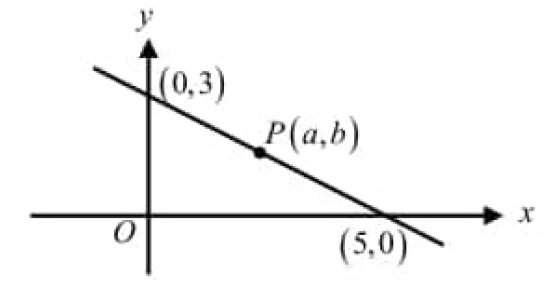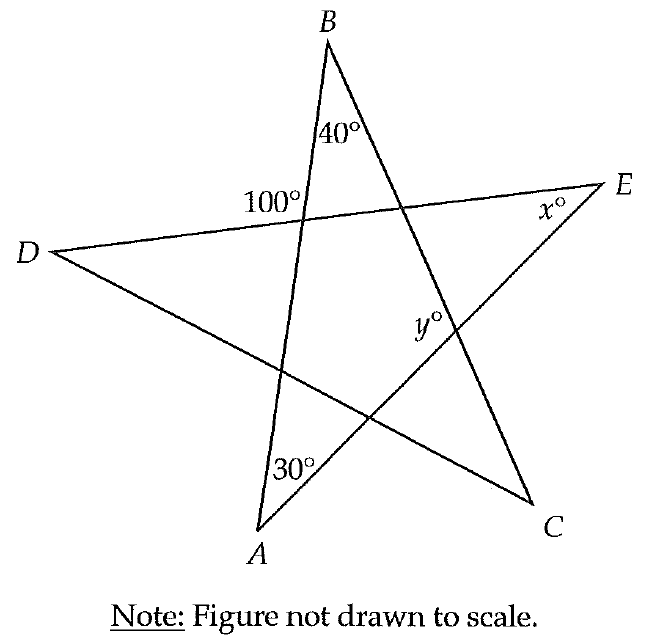PROVING QUADRILATERALS ARE PARALLELOGRAMS
In this section, you will learn how to prove that a quadrilateral is a parallelogram.
We can use the following Theorems to prove the quadrilateral are parallelograms.
Theorems
Theorem 1 :
If both pairs of opposite sides of a quadrilateral are congruent, then the quadrilateral is a parallelogram.
It has been illustrated in the diagram shown below.
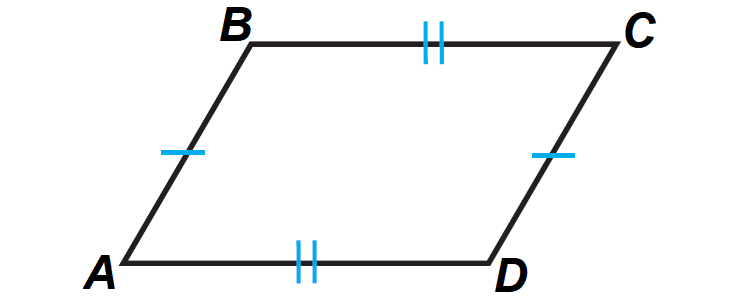
In the diagram above,
AB ≅ DC
AD ≅ BC
Theorem 2 :
If both pairs of opposite angles of a quadrilateral are congruent, then the quadrilateral is a parallelogram.
It has been illustrated in the diagram shown below.
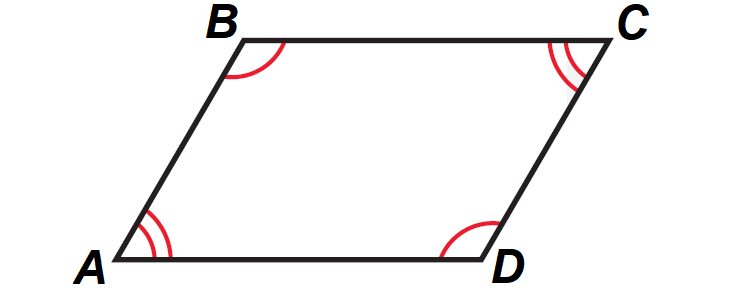
In the diagram above,
m∠A ≅ m∠C
m∠B ≅ m∠D
Theorem 3 :
If an angle of a quadrilateral is supplementary to both of its consecutive angles, then the quadrilateral is a parallelogram.
It has been illustrated in the diagram shown below.
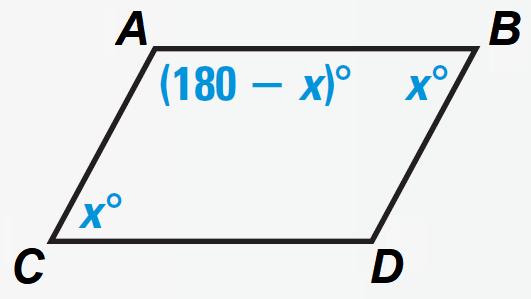
In the diagram above,
m∠A + m∠B = 180°
m∠B + m∠C = 180°
m∠C + m∠D = 180°
m∠A + m∠D = 180°
Theorem 4 :
If the diagonals of a quadrilateral bisect each other, then the quadrilateral is a parallelogram.
It has been illustrated in the diagram shown below.
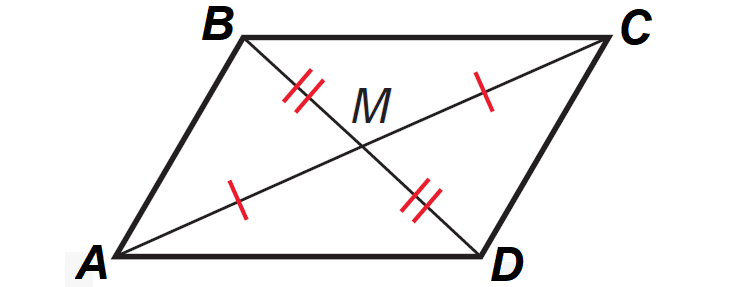
In the diagram above,
AM ≅ CM
BM ≅ DM
Theorem 5 :
If one pair of opposite sides of a quadrilateral are congruent and parallel, then the quadrilateral is a parallelogram.
It has been illustrated in the diagram shown below.
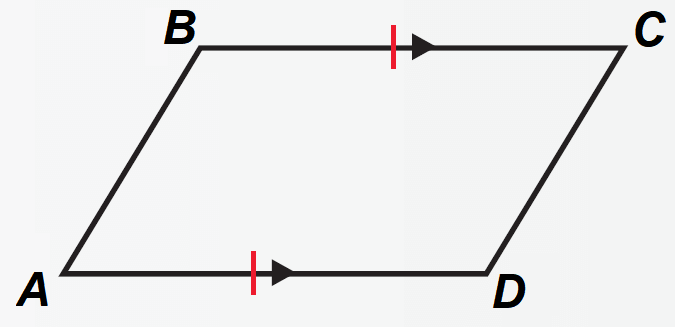
In the diagram above,
AD ≅ BC
AD || BC
Solved Problems
Problem 1 :
In the diagram given below, if AB ≅ CD, AD ≅ CB, then prove that ABCD is a parallelogram.
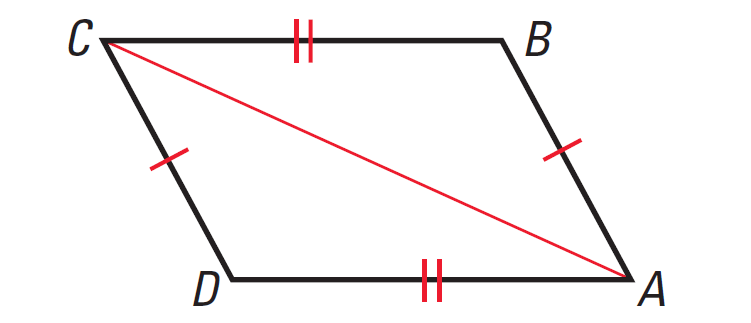
Solution :
|
Statements AB ≅ CD, AD ≅ CB aaaaaaa AC ≅ AC aaaaa aaaaaaaaaaaaaaaaaaaaaa ΔABC ≅ ΔCDA aa m∠BAC ≅ m∠DCA a aa m∠DAC ≅ m∠BCA aa aaaaaaaaaaaaaaaaaaaaaa aa AB || CD, AD || CB a aaaaaaaaaaaaaaaaaaaaa ABCD is a parallelogram |
Reasons Given Reflexive Property of Congruence SSS Congruence Postulate Corresponding parts of congruent triangles are congruent Alternate Interior Angles Converse Definition of parallelogram |
Problem 2 :
In the diagram given below, if BC || DA, BC ≅ DA, then prove that ABCD is a parallelogram.
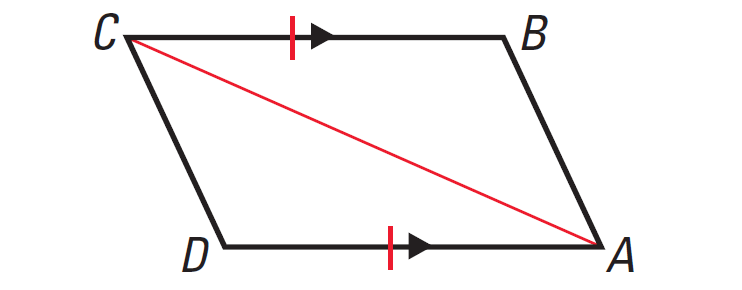
Solution :
|
Statements BC || DA aa m∠DAC ≅ m∠BCA aa aaaaaaaaaaaaaaaaaaaa aaaaaaa AC ≅ AC aaaaa aaaaaaaaaaaaaaaaaaaaaa ΔABC ≅ ΔCDA BC ≅ DA ΔABC ≅ ΔCDA aaaaaa BC ≅ DA aaaaa aaaaaaaaaaaaaaaaaaaaaa aaaaaaaaaaaaaaaaaaaaaa ABCD is a parallelogram |
Reasons Given Alternate Interior Angles Converse Reflexive Property of Congruence SSS Congruence Postulate Given SAS Congruence Postulate Corresponding parts of congruent triangles are congruent If opposite sides of a quadrilateral are congruent, then it is a parallelogram |
Problem 3 :
Show that A(2, - 1), B(1, 3), C(6, 5) and D(7, 1) are the vertices of a parallelogram.
Solution :
Let us plot the given points in a coordinate plane as shown below.
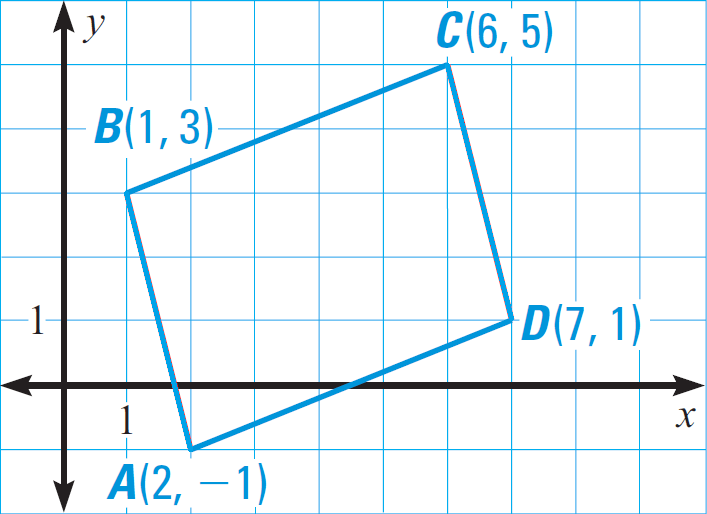
There are many ways to prove that the given points are the vertices of a parallelogram.
Method 1 :
Show that opposite sides have the same slope, so they are parallel.
Using slope formula to find the slopes of AB, CD, BC and DA.
Slope of AB = [3 - (-1)]/[1 - 2] = -4
Slope of CD = [1 - 5]/[7 - 6] = -4
Slope of BC = [5 - 3]/[6 - 1] = 2/5
Slope of DA = [- 1 - 1]/[2 - 7] = 2/5
AB and CD have the same slope. So they are parallel.
Similarly, BC and DA are parallel.
Because opposite sides are parallel, ABCD is a parallelogram.
Method 2 :
Show that opposite sides have the same length.
Using distance formula to find the lengths of AB, CD, BC and DA.
AB = √[(1 - 2)2 + (3 + 1)2] = √17
CD = √[(7 - 6)2 + (1 - 5)2] = √17
BC = √[(6 - 1)2 + (5 - 3)2] = √29
DA = √[(2 - 7)2 + (- 1 - 1)2] = √29
From the lengths AB, CD, BC and DA, it is clear that
AB ≅ CD and BC ≅ DA
Because both pairs of opposite sides are congruent, ABCD is a parallelogram.
Method 3 :
Show that one pair of opposite sides is congruent and parallel.
Find the slopes and lengths of AB and CD as shown in Methods 1 and 2.
Slope of AB = Slope of CD = -4
Because AB and CD have the same slope, they are parallel.
AB = CD = √17
Because AB and CD have the same length, they are congruent.
So, ABCD is a parallelogram.
Kindly mail your feedback to v4formath@gmail.com
We always appreciate your feedback.
©All rights reserved. onlinemath4all.com
Recent Articles
-
Digital SAT Math Problems and Solutions (Part - 134)
Apr 02, 25 12:40 AM
Digital SAT Math Problems and Solutions (Part - 134) -
SAT Math Resources (Videos, Concepts, Worksheets and More)
Apr 02, 25 12:35 AM
SAT Math Resources (Videos, Concepts, Worksheets and More) -
Digital SAT Math Problems and Solutions (Part 135)
Apr 02, 25 12:32 AM
Digital SAT Math Problems and Solutions (Part 135)
